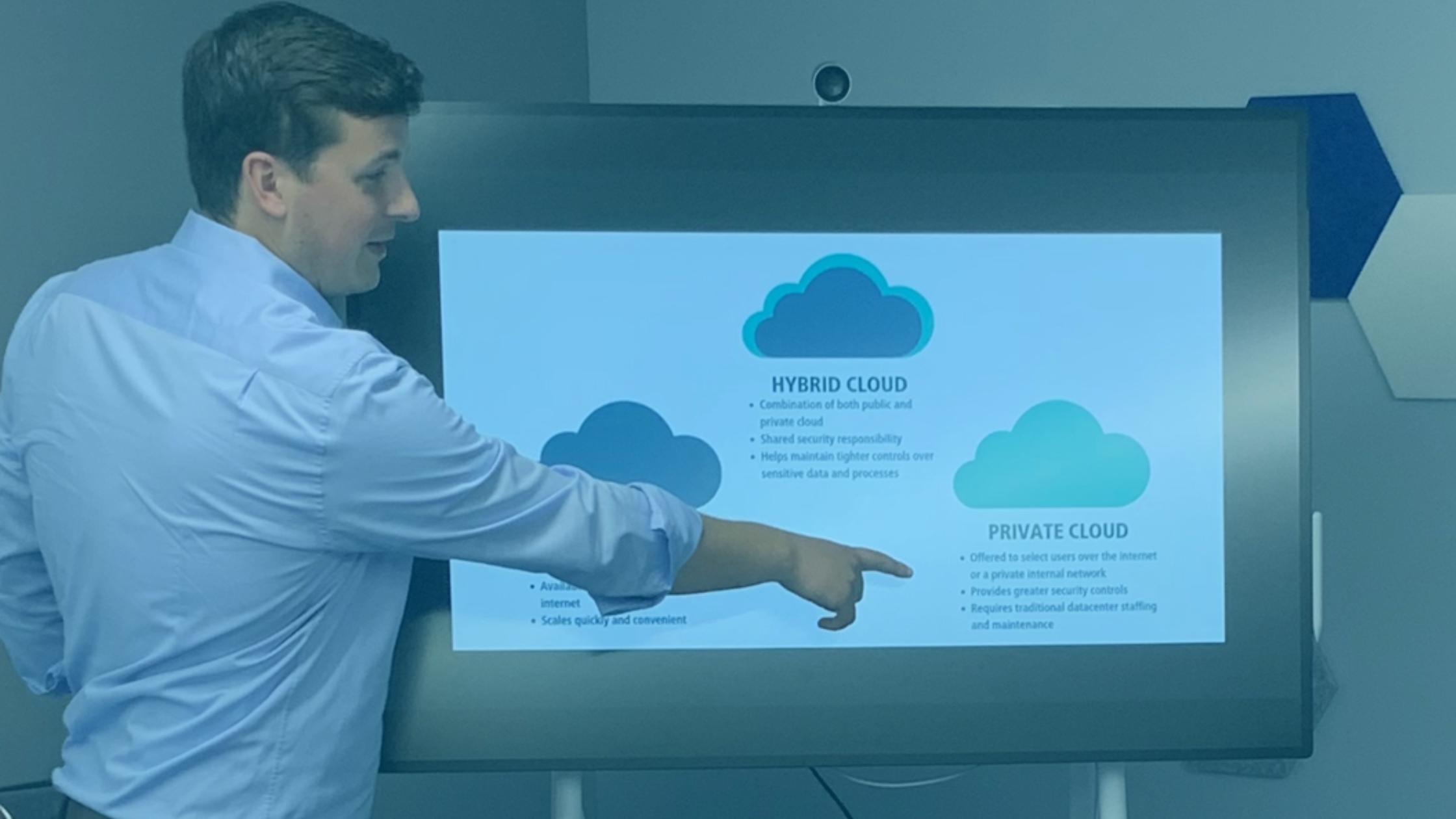
Introduction
In today’s modern business world, it’s imperative for most organizations, no matter what size, to utilize the cloud for scalable, flexible, and cost-effective solutions for storage, computing, and software delivery. For one, the cloud allows businesses to store vast amounts of data without the organization needing an actual on-site structure for data storage at their location. This means that businesses can access their data from anywhere in the world, at any time, making it especially convenient for those who work remotely, travel for work, or follow a hybrid model.
That isn’t the only upside of the cloud either, since there is a range of benefits and functionalities for businesses. These include reliable data backup and recovery solutions in the event of a system failure or data loss event and Infrastructure as a Service (IaaS) solutions that provide businesses with virtualized computing resources. There’s even Software as a Service (SaaS), that offers businesses access to a wide range of productivity, collaboration, and business management tools, as well as cloud-based communication tools like email, messaging, and video conferencing, or data analytics and business intelligence platforms, which enable businesses to analyze large volumes of data.
Overall, the cloud serves as a versatile and indispensable technology platform for businesses, offering an array of services and capabilities to support various business operations, enhance productivity, drive innovation, and accelerate digital transformation efforts. Yet, there isn’t just one type of cloud for all businesses. Many organizations often struggle with whether to use private cloud or public cloud solutions. In this blog, we’ll break down the differences between the two and guide you in determining which type of cloud is right for your business. We’ll also break down the advantages of partnering with the MSP, Charles IT, for your cloud solution needs.
What is the Difference Between a Private Cloud and a Public Cloud?
When it comes to adopting cloud services, businesses often face the decision between deploying a private cloud or leveraging a public cloud. Understanding the differences between these two options is crucial for making informed decisions about cloud adoption strategies. Let’s break down the difference:
What is a Private Cloud?
A private cloud refers to a cloud computing environment that is dedicated exclusively to a single organization. Unlike public clouds, which are shared among multiple users and hosted by third-party providers, private clouds are typically hosted on-premises or in data centers owned and operated by the organization itself. This provides businesses with greater control over their cloud resources, infrastructure, and security policies.
Key Characteristics of a Private Cloud:
- Dedicated Resources: In a private cloud environment, computing resources such as servers, storage, and networking infrastructure are dedicated solely to the organization, ensuring consistent performance and reliability.
- Enhanced Security: Private clouds offer enhanced security and data privacy compared to public clouds, as they are isolated from other organizations and can be customized to meet specific security requirements and compliance standards.
- Customization and Control: Businesses have full control over the configuration, management, and customization of their private cloud environment, allowing them to tailor resources and services to meet their unique needs and preferences.
- Scalability and Flexibility: While private clouds offer scalability and flexibility similar to public clouds, businesses may need to invest in additional hardware and infrastructure to accommodate growth, which can limit scalability compared to public cloud solutions.
What is a Public Cloud?
In contrast, a public cloud refers to a cloud computing environment that is shared among multiple users and hosted by third-party providers, such as Amazon Web Services (AWS), Microsoft Azure, or Google Cloud Platform (GCP). Public clouds offer scalable, on-demand resources and services, accessible to users over the internet on a pay-as-you-go basis.
Key Characteristics of a Public Cloud:
- Shared Infrastructure: Public clouds are built on shared infrastructure, allowing multiple users to access computing resources, storage, and applications from a common pool of resources. This multi-tenant model enables providers to achieve economies of scale and offer cost-effective solutions to users.
- On-Demand Access: Public clouds provide users with on-demand access to a wide range of services and resources, including virtual machines, storage, databases, and software applications, without the need for upfront investment in hardware or infrastructure.
- Scalability and Elasticity: Public clouds offer unparalleled scalability and elasticity, allowing users to scale resources up or down in response to changing demand, ensuring optimal performance and cost efficiency.
- Managed Services: Public cloud providers offer a variety of managed services and tools, such as infrastructure management, security, monitoring, and automation, to simplify deployment, management, and operations for users.
What are the Advantages of a Private Cloud?
While both private and public clouds offer valuable benefits, a private cloud solution provides distinct advantages that make it a great option for many businesses. Here are some key benefits of deploying a private cloud:
-
Increased Customization:
One of the primary advantages of a private cloud is the ability for businesses to customize the cloud environment to meet their specific needs and preferences. Unlike public clouds, which offer standardized solutions, private clouds allow organizations to tailor resources, applications, and services to align with their unique requirements and workflows.
With a private cloud, businesses have full control over the configuration, management, and optimization of their cloud infrastructure, enabling them to implement custom solutions that address their specific challenges and opportunities.
-
Enhanced Security:
A private cloud offers enhanced security compared to public clouds, as it provides dedicated resources and isolation from other organizations.
With a private cloud, businesses can implement strong security measures, such as encryption, access controls, intrusion detection, and data loss prevention, to protect against cyber threats and unauthorized access. This level of security assurance is particularly important for industries with strict compliance requirements, such as healthcare, finance, and government.
-
Regulatory Compliance:
A private cloud can help businesses that operate in highly regulated industries achieve and maintain regulatory compliance more effectively than public clouds.
By deploying a private cloud, businesses can implement security controls, data encryption, and audit trails that align with industry-specific regulations and compliance frameworks, such as HIPAA, GDPR, PCI DSS, and SOX. This ensures that sensitive data is protected, privacy is maintained, and regulatory requirements are met without compromise.
-
Performance and Reliability:
Private clouds offer consistent performance and reliability, as they provide dedicated resources and infrastructure exclusively for the organization's use. This ensures predictable performance levels and high availability for critical applications and workloads.
With a private cloud, businesses can avoid performance fluctuations and resource contention issues that may occur in public clouds due to shared infrastructure. This reliability is essential for businesses that depend on consistent performance to support their operations and deliver exceptional customer experiences.
-
Control and Flexibility:
A private cloud provides businesses with greater control and flexibility over their cloud environment, allowing them to make changes, upgrades, and optimizations as needed without dependencies on external providers.
With a private cloud, businesses have the freedom to deploy custom solutions, integrate legacy systems, and adopt emerging technologies at their own pace, without constraints imposed by third-party providers or shared infrastructure.
Determining What Type of Cloud for Your Organization
The decision between deploying a private cloud or leveraging a public cloud depends on various factors, including security requirements, compliance considerations, budget constraints, and scalability needs. While private clouds offer greater control, security, and customization, they require significant upfront investment in infrastructure and ongoing maintenance. In contrast, public clouds provide cost-effective, scalable, and on-demand solutions, but may raise concerns about data privacy, security, and compliance.
At Charles IT, we understand that every business has unique requirements and challenges when it comes to cloud adoption. Our team of experts can help you assess your needs, evaluate the benefits and trade-offs of private and public clouds, and develop a tailored cloud strategy that aligns with your business goals and objectives. Whether you're looking to deploy a private cloud, leverage a public cloud, or implement a hybrid cloud solution, we're here to guide you every step of the way.
How Charles IT Can Assist in Your Private Cloud or Public Cloud Needs?
Once Charles IT helps you discover which type of cloud is right for your business, we can work with you in deploying those cloud solutions. In terms of a public cloud, we can help you make the move to a cloud platform while keeping your infrastructure secure with our long and short-term public cloud services. We’ll do that by optimizing your current resources and handling the migration before then managing your service and backups. That way we can ensure that your cloud security services keep your organization’s data secure and private, which are usually factors private cloud services lack. Additionally, while leading public cloud platforms like Microsoft Azure offer several different features for all kinds of businesses, many don’t provide close monitoring and management. That’s where Charles IT comes in since we will make sure your organization isn’t just receiving the top IT services but that it’s also getting the best security.
When it comes to a private cloud, Charles IT’s Daas, or Desktop as a Service, the solution allows companies to access their data, applications, and content from anywhere in the world, anytime day or night, from a wide range of devices. Yet, it also keeps your data secure, without breaking the bank. That’s because our private cloud solutions offer all the benefits of a virtual desktop, without having to buy, build, and manage your infrastructure. Charles IT can even create custom DaaS solutions that are scalable and tailored to your organization’s migration plans and needs.
By partnering with Charles IT for either private cloud or public cloud solutions, businesses can expect to see positive results like a staff who enjoys high-quality collaboration from their laptops, phones, and tablets even when they’re not in the same building. Organizations can also expect to have a secure, scalable, easy-to-use solution for IT administrators, as well as noticeable flexibility and productivity improvements across the business. Most importantly, you and your staff will find that you have more time to focus on your business when you’re not concerned about your cloud technology.
Conclusion
The decision between a private cloud and a public cloud can significantly impact your business's IT infrastructure, security, and overall performance. Understanding your specific cloud needs is important to making an informed decision. Whether you require greater control over your IT environment, heightened security measures, or adherence to strict regulatory requirements, a private cloud may offer tailored solutions to your business demands. However, if scalability, cost-efficiency, and flexibility are your priorities, a public cloud could be the better choice.
At Charles IT, we recognize that navigating the complexities of cloud computing can be stressful. That's why our team of experts is here to assist you in determining the ideal cloud solution for your business. Whether you're considering a private cloud deployment, exploring the benefits of a public cloud, or seeking a hybrid cloud approach, our tailored strategies and comprehensive support ensure a seamless transition to the cloud.
Ready to elevate your business's IT infrastructure with a cloud solution tailored to your unique needs? Contact Charles IT today to learn more about how our managed services can assist in your organization's digital transformation.




